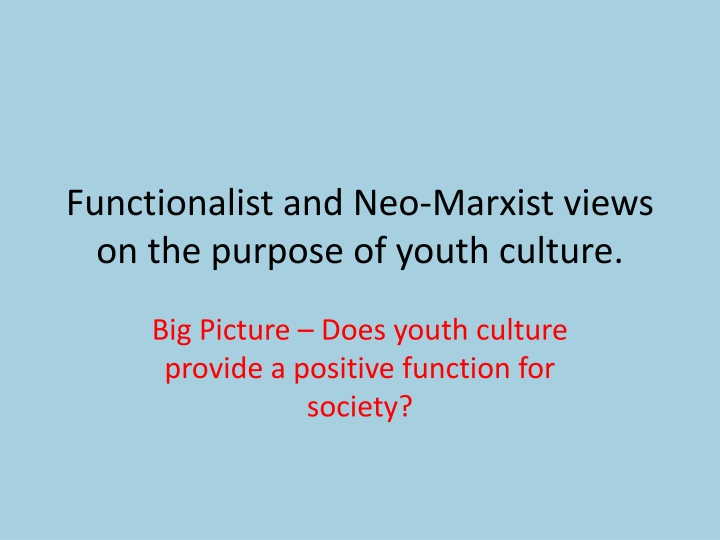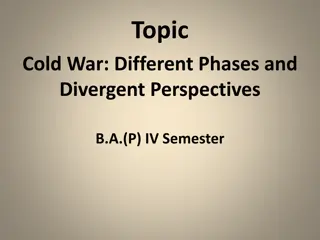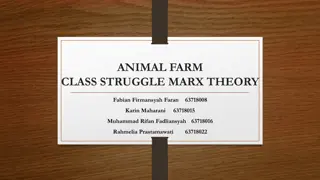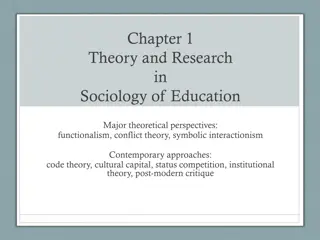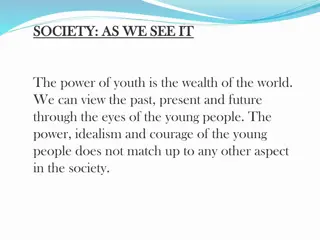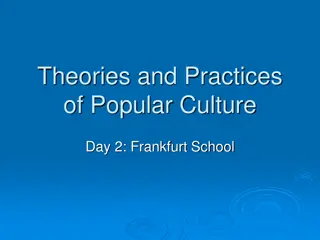Perspectives on Youth Culture Through Functionalist and Neo-Marxist Views
Functionalist and Neo-Marxist perspectives on youth culture offer contrasting views on its purpose in society. Functionalist theorists emphasize the role of youth culture in providing a transitional phase for young people, aiding in their social integration and development of independence. On the other hand, Neo-Marxist viewpoints highlight how certain youth subcultures emerge as a form of resistance to capitalist oppression and class inequalities. The discussion delves into the functions served by youth culture, including social integration, identity formation, and economic contribution, while also exploring its role in challenging mainstream societal norms. The analysis provides a comprehensive understanding of the complex interactions between youth culture and broader social structures.
Download Presentation

Please find below an Image/Link to download the presentation.
The content on the website is provided AS IS for your information and personal use only. It may not be sold, licensed, or shared on other websites without obtaining consent from the author.If you encounter any issues during the download, it is possible that the publisher has removed the file from their server.
You are allowed to download the files provided on this website for personal or commercial use, subject to the condition that they are used lawfully. All files are the property of their respective owners.
The content on the website is provided AS IS for your information and personal use only. It may not be sold, licensed, or shared on other websites without obtaining consent from the author.
E N D
Presentation Transcript
Functionalist and Neo-Marxist views on the purpose of youth culture. Big Picture Does youth culture provide a positive function for society?
What function do you think youth culture serves? Think about how youth has changed since WWII and what need you think youth culture satisfies. Functionalists believe that youth culture offers young people a transitory phase between childhood and adulthood. This allows for social integration. What would happen if there was no phase?
A Rite of passage Talcott Parsons (1954) Functionalist , stated that this phase allows young people to become more separated from parents paving the way for independence later on. Example part-time job whilst in 6thform provides a little experience of money management. Parsons viewed this as a phase through which all young people must pass.
A shared way of life Functionalists believe that shared culture is important for society and integration. Einstadt (1956) suggested youth culture binds young people together and also provides an outlet for the tensions felt by the young. Abrahms (1959) after WWII the youth had more spending power and so became an important part of the economy providing another function in society. A third function suggested is that young people suffer an identity crisis and that peer groups help them to overcome this.
Using the PEAE formula 1. Explain the term rite of passage 2. Explain two important functions that youth culture serves according to Einstadt and Abrams. 3. Provide everyday examples for each point 4. Analyse and evaluate each point
Youth Culture as resistance to mainstream culture Marxists believe that some youth cultures have evolved as a resistance to the oppression of capitalism and the inequalities it causes in the class system. Teddy Boys (Jefferson 1976) Skinheads (Clarke 1976) Hippies (Brake 1980) https://www.youtube.com/watch?v=wRhW2CyrqhQ Have all been linked to issues of class. http://www.youtube.com/watch?v=JfxA9Bp6ds4 http://www.youtube.com/watch?v=SJT7tIICqhY
Youth Subcultures NEO-MARXIST
Neo-Marxist perspective on Youth Sub- cultures based on Marxism but with added focus on economic factors e.g Hall working for the CCCS believed that the different youth cultures exist for adolescents to distinguish themselves amongst mass culture. This can be seen as a form of resistance to authority and capitalism. Jefferson (1976) Teddy Boys - A group who wish to recreate a sense of working class community- due to the growing affluence in post war British society- These youth cultures believed they were gaining status and protecting territory
Neo Marxist They criticise Functionalist perspectives which say that social class is irrelevant to the growth of youth sub-cultures. They explain the arise of some youth sub- culture in terms of class related issues like:- Unemployment in w/c type jobs e.g labouring Inner city decay Strikes
Read page 254-255 of OCR book and write a paragraph explaining these concepts related to Marxist view of youth sub-culture. Include a researcher s name. Resistance Exaggeration Magical Solutions Incorporation
Essay Plan Discuss the view that youth cultures are a form of resistance (35) Intro- Marxists and Neo-Marxists believe that youth cultures emerge because of inequalities caused by capitalism. Other sociologists like Functionalist say the purpose of youth culture is to provide transition to adulthood (Rite of passage). However many youth cultures have been linked to class struggles and deviance. P1 Jefferson and Teddy Boys linked to low status + criticisms and analysis P2 Clarke and Skinheads + criticisms and analysis P3 - Brake and Hippies + criticisms and analysis P4 Post Modernist, Thornton says club culture of the 1990s more to do with being cool than class + criticisms and analysis P5 We still have names for lower-class youth cultures ! What about London Riots of 2011 evidence of resistance? Conclusion Are youth cultures a form of resistance to capitalism or not? REMEMBER TO LINK EACH POINT TO THE QUESTION !!!!!
